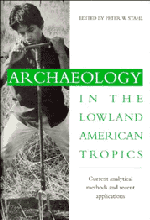Book contents
- Frontmatter
- Contents
- List of figures
- List of tables
- List of contributors
- Introduction
- 1 Archaeological survey and site discovery in the forested neotropics
- 2 The archaeology of community organization in the tropical lowlands: a case study from Puerto Rico
- 3 Archaeological methods for the study of ancient landscapes of the Llanos de Mojos in the Bolivian Amazon
- 4 Searching for environmental stress: climatic and anthropogenic influences on the landscape of Colombia
- 5 “Doing” paleoethnobotany in the tropical lowlands: adaptation and innovation in methodology
- 6 Plant microfossils and their application in the New World tropics
- 7 Differential preservation histories affecting the mammalian zooarchaeological record from the forested neotropical lowlands
- 8 Biological research with archaeologically recovered human remains from Ecuador: methodological issues
- 9 Interpreting dietary maize from bone stable isotopes in the American tropics: the state of the art
- 10 From potsherds to pots: a first step in constructing cultural context from tropical forest archaeology
- 11 Returning to Pueblo Viejo: history and archaeology of the Chachi (Ecuador)
- References
- Index
4 - Searching for environmental stress: climatic and anthropogenic influences on the landscape of Colombia
Published online by Cambridge University Press: 23 November 2009
- Frontmatter
- Contents
- List of figures
- List of tables
- List of contributors
- Introduction
- 1 Archaeological survey and site discovery in the forested neotropics
- 2 The archaeology of community organization in the tropical lowlands: a case study from Puerto Rico
- 3 Archaeological methods for the study of ancient landscapes of the Llanos de Mojos in the Bolivian Amazon
- 4 Searching for environmental stress: climatic and anthropogenic influences on the landscape of Colombia
- 5 “Doing” paleoethnobotany in the tropical lowlands: adaptation and innovation in methodology
- 6 Plant microfossils and their application in the New World tropics
- 7 Differential preservation histories affecting the mammalian zooarchaeological record from the forested neotropical lowlands
- 8 Biological research with archaeologically recovered human remains from Ecuador: methodological issues
- 9 Interpreting dietary maize from bone stable isotopes in the American tropics: the state of the art
- 10 From potsherds to pots: a first step in constructing cultural context from tropical forest archaeology
- 11 Returning to Pueblo Viejo: history and archaeology of the Chachi (Ecuador)
- References
- Index
Summary
In memory of Don Lathrap, who was never afraid to paint with a broad brush.
This chapter explores two interfaces: one between human culture and the natural environment; the other between highland and lowland regions of Colombia. The starting point is a series of archaeological—environmental studies in the Caribbean lowlands and in certain highland areas of the country. These investigations are chosen because they draw attention to a number of methodological issues, the first of which is that (contra much romantic mythology) there is no essential difference between tropical lowland archaeology and archaeology as practiced elsewhere. The work of Roosevelt (1991) on Marajó Island, of Mora et al. (1991) in Colombian Amazonia, and of several contributors to the present volume, demonstrates that most techniques of field investigation are practicable in the American tropics, and that information about subsistence patterns and environmental conditions can be recovered from rainforest excavations. Conceptually, too, there is little that is unique to lowland archaeology. The comprehension gap that exists between “lowland” and “highland” specialists seems (to an outsider, at least) to have more to do with personal psychologies that with philosophical incompatibility.
If these assertions are true, it follows that most of the central questions of archaeology are potentially testable against lowland data.
- Type
- Chapter
- Information
- Archaeology in the Lowland American TropicsCurrent Analytical Methods and Applications, pp. 96 - 112Publisher: Cambridge University PressPrint publication year: 1995
- 11
- Cited by



